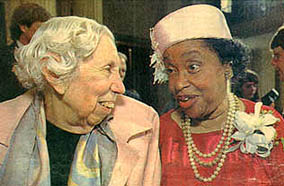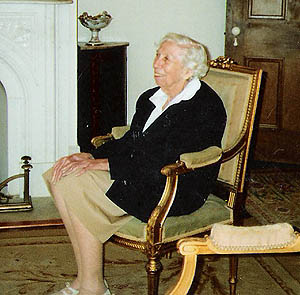Major Works
- Photographs (1989)
- Morgana: Two Stories from ‘The Golden Apples’ (1988)
- One Writer’s Beginnings (1984) (autobiography)
- The Collected Stories of Eudora Welty (1980)
- The Eye of the Story (selected essays and reviews) (1978)
- The Optimist’s Daughter (novel) (1972)
- One Time, One Place: MS in the Depression: A Snapshot Album (1971)
- “A Flock of Guinea Hens Seen from a Car” (poem) (1970)
- Losing Battles (novel) (1970)
- A Sweet Devouring (nonfiction) (1969)
- Thirteen Stories (1965)
- The Shoe Bird (juvenile) (1964)
- “Place in Fiction” (lectures for conference on American Studies in Cambridge, England) (1957)
- The Bride of the Innisfallen, and Other Stories (1955)
- The Ponder Heart (novel) (1954)
- Selected Stories (1953)
- The Golden Apples (1949)
- Music from Spain, Levee Press (1948)
- Delta Wedding (novel) (1946)
- The Wide Net, and Other Stories (1943)
- The Robber Bridegroom (novella) (1942)
- “A Curtain of Green,” with a preface by Katherine Anne Porter, Doubleday, 1941, re-published as A Curtain of Green, and Other Stories, (1964)
- “Death of a Traveling Salesman” (1936)
Read photographer Mark Wilkins’s story of his day with Eudora Welty below
Eudora Welty: A Biography
Brandi Love Zuber, 1997 (SHS)
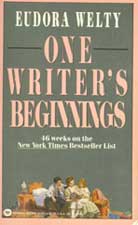 Eudora Alice Welty was born April 13, 1909, at the Welty estate on North Congress Street in Jackson, Mississippi, to Christian Webb and Chestina Andrew Welty. The house Welty’s family lived in was built by her father when he and his wife first moved to Jackson. Eudora, the oldest and only daughter of the family, recalls in her autobiography One Writer’s Beginnings the importance of reading in her childhood home. In fact, says DiConsiglio, “Books were so valued that once when the house caught a fire, her mother threw out volumes of Dickens before getting herself to safety.” Welty also remembers the importance of knowing the alphabet. She explains, “You learned the alphabet like you learned your address and phone number in case you got lost” (DiConsiglio 4). She also recalls reciting the alphabet along with crediting her father for giving her a strong meteorological sensibility at an early age. Although born in the South, some critics do not consider her to be a Southern writer. Perhaps the influence of her father, who came from Ohio, and her mother, who was a native of West Virginia, have made her a more universal-type writer.
Eudora Alice Welty was born April 13, 1909, at the Welty estate on North Congress Street in Jackson, Mississippi, to Christian Webb and Chestina Andrew Welty. The house Welty’s family lived in was built by her father when he and his wife first moved to Jackson. Eudora, the oldest and only daughter of the family, recalls in her autobiography One Writer’s Beginnings the importance of reading in her childhood home. In fact, says DiConsiglio, “Books were so valued that once when the house caught a fire, her mother threw out volumes of Dickens before getting herself to safety.” Welty also remembers the importance of knowing the alphabet. She explains, “You learned the alphabet like you learned your address and phone number in case you got lost” (DiConsiglio 4). She also recalls reciting the alphabet along with crediting her father for giving her a strong meteorological sensibility at an early age. Although born in the South, some critics do not consider her to be a Southern writer. Perhaps the influence of her father, who came from Ohio, and her mother, who was a native of West Virginia, have made her a more universal-type writer.
Welty attended Central High School in Jackson Mississippi, between 1921 and 1925. After completing high school, Welty went to Mississippi State College for Women (now MUW) in Columbus, Mississippi, from 1925 to 1927. According to one source, she left MUW, and “Encouraged by her parents, she transferred to the University of Wisconsin in 1927 where she became an English major and began a more serious and focused study of English literature under Ricardo Quintana and other professors” (VandeKieft 4). Later, after she received her bachelor of arts degree in 1929, Eudora attended Columbia University Graduate School of Business in New York and studied advertising. During the time Welty was in New York, she had a varied social life. Indeed, Welty went dancing and attended the theater regularly. Welty commented, “For somebody who had never, in a sustained manner, been to the theater or to the Metropolitan Museum, where I went every Sunday, it was just a cornucopia” (Conversations with Eudora Welty, Gretlund 459).
During the Depression, Welty returned to Jackson, MS. In 1931, the same year that she returned, her father suddenly passed away. His death was a great loss to her and her family. Welty soon began looking for jobs in advertising and publicity. The first job she obtained was a part-time job with radio station WJDX. Next, she got a full-time job with the Works Progress Administration as a Junior Publicity Agent. Welty’s job duties were writing newspaper copies and taking photographs of places after destruction, studying troubled juveniles, putting booths in county fairs, and interviewing various people. In an interview with Jean Todd Freeman, Welty told how she enjoyed her job. “It took me all over Mississippi, which was the most important thing to me, because I’d never seen it … [The experience] was the real germ of my wanting to become a real writer, a true writer” (Gunton 459). Finally, in June of 1936, Eudora Welty’s career sparked with her first published short story, “Death of a Traveling Salesman,” which appeared in a small magazine called Manuscript .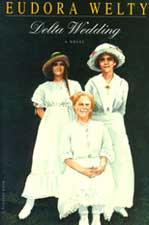
Welty’s career began to flourish. Her first novel Delta Wedding was published in 1946. Just as Welty’s writings were getting national attention, she was hit with family tragedy. At the age of forty-six, it became necessary for Welty to take care of her family and put her work aside. Both of her brothers were diagnosed with severe arthritis, while her mother was paralyzed by a stroke. Welty spent the next fifteen years caring for her helpless family. Unhappily, she faced the death of her mother and brothers in 1966. In short, Eudora Welty was now alone with no family.
Miss Welty began her career again with The Optimist’s Daughter, a novel which in 1969 won the Pulitzer Prize. Early in her career she served as a member of the New York Times book staff. She has also been a lecturer and writer- in-residence at various colleges. Welty is now considered the “literary voice and soul of the South” (DiConsigilo 4). Lately, Eudora has faced failing health. Her arthritis makes writing painful, poor hearing prevents the grabbing of bits dialogue for her characters, and an injured back keeps her confined to the house. Now, at the age of eighty-nine, Eudora is still in the same house her father built in Jackson, Mississippi. She is the first living writer ever to be included in the prestigious Library of America series. Included in the volume of her work for this series are short stories and a number of novels in the Southern Gothic tradition. Welty’s memoir (One Writer’s Beginnings) as well as A Curtain of Green, The Wide Net, The Golden Apples, and The Bride of the Innisfallen are included in the Library of America volume. Richard Ford is the editor .
In addition to the many short stories and novels Eudora Welty has written, she is also a well-known photographer. A list of her literary works which have won her many prizes is included in the major works section of this page.
Note: Eudora Welty died at the age of 92 on July 22, 2001.
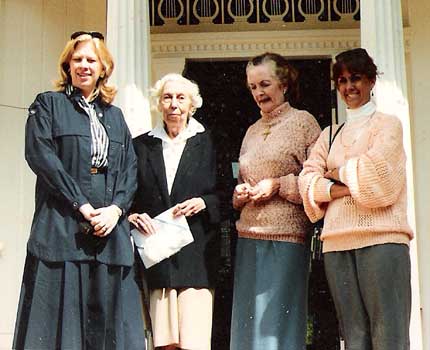
Eudora Welty at Waverly mansion, 1988. Donna Snow and Nancy Hargrove stand to Welty’s left. Photo courtesy of Nancy Hargrove.
Eudora Welty: A Living Legend
by Candi Jennings (SHS)
In Jackson, Mississippi, on April 13, 1909, Eudora Welty was born to a “Yankee father” and a mother from West Virginia. She went to public school in Jackson and attended Mississippi State College for Women from 1925 to 1927). She also traveled to Wisconsin, Colombia, and New York to receive degrees and further her education. However, she returned to Jackson to live and write. At the age of eighty-eight, she slowed down her writing because of poor health, but she received France’s highest honor in 1996.
Welty’s early interests were painting and photography. Her career as a writer actually began in June of 1936 with “Death of a Traveling Salesman” in the small magazine called Manuscript, which was edited by John Rood. Since then, her works have been compiled, reviewed, and translated into different languages, including Burmese and Japanese. A small town or rural Mississippi is the setting for a large majority of her stories. Her characters include murderers, psychotics, suicides, deaf-mutes, the mentally retarded and the senile. Welty’s cast of characters may also include a multitude of people who used to be referred to as “common” by the Southern upper class. Over the decades, she’s been considered “one of this century’s most significant writers” (Willie Morris, 105), because of her deep and realistic fiction.
Welty never married. She lived alone in a house that her father built in 1925. She said that when the house was built, it was on a gravel road with pine trees all around. She stated that Southern writers care deeply about place, but she feared this subtle element may be escaping.
“Welty has received four O. Henry Memorial prizes, the M. Carey Thomas Award from Bryn Mawr College, the Brandeis Medal of Achievement, the Hollins medal, and the 1st Annual Award of Excellence from the Mississippi Arts Commission (Donald),” among many others. She also lectured, as well as taught, at many colleges.
Some of her works have also become dramas. The Robber Bridegroom, and The Ponder Heart have been adapted and produced on Broadway. The Ponder Heart has also been adapted as an opera. Her photographs have been displayed in many museums and art galleries across the United States. Welty has been the subject of a film by the PBS (Public Broadcast System), several productions by Mississippi ETV (Educational Television), exhibits at the Mississippi State Historical Museum, literary seminars and numerous books of literature study and criticism. The Ponder Heart was filmed in March, 2000. The Library of America has published two volumes of her work in their important series.
Welty served on such boards as the National Council on the Arts, the Millsaps College Board of Trustees, and the Board of Directors New Stage Theater. In 1973, May the 2nd was designated to be Eudora Welty Day in Mississippi. The Eudora Welty-Americana Award has been established in her honor by Mississippi for ETV. The Eudora Welty New American Playwrights Series established by New Stage Theater and The Eudora Welty Chair of Southern studies established by Millsaps College also honor Ms. Welty.
Awards and Honors Presented to Eudora Welty
- Guggenheim Award 1942
- O. Henry Award 1942, 1943, 1968
- National Institute of Arts and Letters 1944
- Grants in literature 1972
- Gold Medal for fiction writing
- William Dean Howells Medal from American Academy of Arts and Letters for The Ponder Heart 1955
- Edward McDowell Medal 1970
- National Book Award for fiction (Losing Battles) 1971
- Christopher Book Award for “One Time, One Place: Mississippi in the Depression; A Snapshot“1972
- Pulitzer Prize in fiction for The Optimist’s Daughter 1973
- National Medal for Literature 1980
- American Book Award for The Collected Stories of Eudora Welty 1961 and One Writer’s Beginnings 1984
- CommonWealth Awards for Distinguished Service in Literature from Modern Language Association of America 1984
- National Book Critics Circle Award and Los Angles Times Book Prize nominations for One Writer’s Beginnings 1984
- National Medal of Arts 1987
- French Legion of Honor-(highest civilian honor) 1996
- First living writer ever to be included in the prestigious Library of America series, 1999.The Library of America has released two volumes of works by Welty: Eudora Welty: Complete Novels and Eudora Welty: Stories, Essays, and Memoir
- Inducted in to the Mississippi Arts + Entertainment Experience Hall of Fame (2017)
A Day With Eudora Welty: An Email Interview with Photographer Mark Wilkins
Mark, could you explain how you happened to take the picture of Eudora Welty?
“Ah, Yes that day of awe and wonder…I was lucky enough to be working for PBS on a TV series called “Great Drives,” a documentary that was shot over a two week period covering the highway from Memphis to New Orleans and back.
I was hired as a boom operator (That’s the guy that mikes talent and holds
the mike on a boom pole) and assistant to the location audio mixer, Andy
Black. I had just purchased a Nikon F-3 and brought it along since photography was just a hobby at that juncture.Little did I know that the photos I took would be my most valuable and
treasured images to date. The first week I snapped images of Eudora Welty, Shelby Foote, and Willie Morris to mention a few..What a bonus!!”
What was Eudora Welty like in person?
“The interview that day was conducted in a guest house room that the crew
housed in the following night. Eudora arrived that morning in Jackson, Mississippi, in a limo… It was cool outside,and she was bundled up (just as cute as a bug) and required a wheelchair to get around. She was in a delightful mood, greeting the crew, shaking hands, and had the most enchanting gaze when you looked her in the eyes. She was so kind to everyone, and a boost to all of the crew’s morale. When she spoke on and off camera, it was overwhelming how she made time stand still and took the listener to that special place she spoke of (It was amazing)!”
What happened that was so funny?
“Between you and me, after the interview I scrambled to get my camera because she had been under the lights. I timidly asked her permission, and she lit up with..”That’s a nice camera, young man. What’s your name?”
I replied “Mark”..
She said “Well, let’s get with it. What do you want me to do?”
I replied “Just remember some of the animated hand gestures and looks you just did while telling your incredible stories.”
She laughed and said “Sure, Mark, no problem!”
During those few moments, she told me of her earlier photo ops, early cameras, and a few locations I might want to document. I was so thrilled! The following week I went to the library and was excited to see some of her published photos. I was so inspired with her magic ability to compose and
capture some of those most riveting images..I am inspired to this day seeing her photo work!During that time she produced a silver flask and asked me if I wanted a nip… I declined but said as soon as we are wrapped up, I’d take her up on it. About thirty minutes later when she was making her way back to the limo, she asked again, “Mark,you ready for that nip?”
I stopped what I was doing and replied “Sure!”
I knelt to one knee, and she handed me the flask…I took one little sip,and nearly choked… (I don’t drink whiskey)! It was 101 proof Ezra Brooks Tennessee sippin’ whiskey. She got the biggest kick from watching that liquid fire light me up, and we both had a good laugh! I hugged her and thanked her for a most rewarding experience and wished her all of the best
She wished me the same and got situated in her white stretch, shut the door, waived goodby, and was whisked off to another adventure. I can remember standing there waving back, and after she was gone just saying to myself…WOW! That really counted!!!”
In what way was it enlightening?
“Just seeing her in person was inspiring, seeing how full of life and outgoing she was made me feel proud to hear her call me by name.”
How did she react to your taking her picture?
“She was almost flattered and didn’t hesitate one bit..I know she enjoyed the attention and knew that the camera would capture that moment in time forever. She even commented that in 1/60th of a second so much can be portrayed–most inspiring words from another photographer!”
Reviews
A Review of Why I Live at the P.O.
by Brandi Love Zuber (SHS)
“Why I live at the P.O.” by Eudora Welty is about a young woman moving out of her parents’ home to escape her family, especially her younger sister. She knows she has to face independence on her own and leaves her family to make the post office her new home.
The story opens with the narrator telling how well she is getting along with her “mama, Papa daddy, and Uncle Rondo.” The narrator then begins telling how Stella-Rondo stole her boyfriend, Mr. Whitaker, and married him. Later, Stella-Rondo comes home with a two-year old adopted little girl. When Stella-Rondo arrives home, she begins turning the entire family against her sister, the narrator. The narrator, tired of her younger sister, leaves the house and moves to the post office. She takes everything that belongs to her: electric fan, needlepoint pillow, radio, sewing machine motor, calendar, thermometer, canned goods, wall vases, and even a fern growing outside the house that she feels is rightfully hers because she watered it. The family declares they will never go to the post office again. Finally, the sister is left alone in the post office, safe in her knowledge of who in the town is for or against her. Protesting loudly for her independence and happiness, she works her revenge by shutting her family off from the outside world.
The monologue short story is somewhat of a comedy told with a natural Southern idiom flow. Her descriptive words plant vivid scenes and sounds. From the “gorgeous Add-a-Pearl Necklace,” to the flesh-colored kimono “all cut on the bias,” Welty makes this story a satirical portrait of a Mississippi family. “Why I live at the P.O. ,” tells the story of what jealousy will lead a person to do. I liked it very much because of Welty use of descriptive words that capture a reader’s mind until the end of the story. I also give this story two thumbs up.
A Review of Death of a Traveling Salesman
by Brandi Love Zuber (SHS)
“Death of a Traveling Salesman,” written by Eudora Welty, begins with a man traveling for a shoe company through Mississippi. He has been making the journey for fourteen years, but R.J. Bowman gets lost, starts getting sick, and then has an accident.
The story unfolds with R.J. Bowman on his way to Beulah. He decides to take back roads. Although the roads seem unfamiliar to him, he does not want to admit he is lost. As Bowman continues on the road, he realizes he is on the edge of ravine. Bowman quickly gets his bag and simple case out of his car before it rolls over the edge. Relieved that his car fell in some grapevines, Bowman goes quickly to get help for his car, only he has to stop to rest because he can barely breath. Bowman soon comes to a shotgun of a house. There he sees a woman cleaning a lamp. His heart begins to behave like a rocket about to fly off. Finally, the woman’s husband, Sonny, comes and gets Bowman’s car out of the grapevines. After he spends part of the night with Sonny and his wife, Bowman realizes what is missing in his life–a family.
I found pleasure reading “Death of a Traveling Salesman.” It had a place in my heart. It makes me feel how important family is in my life. The title describes how R.J. Bowman is slowly dying because he is alone. He does not know what it feels like to have a family. In short, Welty is expressing personal feelings on the importance of a family. Once again, I give Eudora Welty’s work two thumbs up.
A Review of “A Worn Path“
by Brandi Love Zuber (SHS)
“A Worn Path” by Eudora Welty begins with an old black woman going to town getting medicine for her grandson. She faces many obstacles, yet she continues. After a closer examination, it became clear that the worn path represents more than a path going to town. It also represents Phoenix and yet life itself. For Phoenix overcomes memory loss and many other obstacles to achieve her journey.
The story opens with Phoenix Jackson walking along the path through the pinewoods. She is carrying a thin, small cane made of an umbrella. The story then begins describing her. She is wearing a red rag, a “dark striped dress reaching down to her shoe tops, and an equally long apron of bleached sugar sacks, with a full pocket: all neat and tidy, but every time she took a step she might have fallen …. ” The story also describes her “worn path” of a face. “Her eyes are blue with age. Her skin had a pattern all its own of numberless branching wrinkles …”
Phoenix Jackson first encounters several wild animals. She simply tells them, “out of my way, all you foxes, owls, beetles, jack rabbits, and coons … Don’t let none of those come running my direction, I got a long way.” Phoenix continues her journey. Her next obstacle is going up a hill. When she finally climbs the hill, her dress gets caught on a bush. After Phoenix escapes, she faces many other struggles. They include crossing a creek on a log, facing memory loss, going through a barbed-wire fence, confronting a scare crow, running from a dog, and falling into a ditch. Finally, Phoenix has an encounter with a man. He helps her out of the ditch but also questions her journey and points a gun in her face. When Phoenix makes it to town, she forgets her purpose. After remembering what she came for, the nurse gives her the medicine. Since it is Christmas time (an important point since this short story is about selfless love) she gets her grandson a toy with some money she got from the man she met along the way and the nurse (she got a nickel from each).
I enjoyed this story very much. The setting of wintertime made Phoenix face the hardships of the weather along with all of the other struggles. The title itself is significant. The worn path is Phoenix’s worn path of her face, but it is also the many paths people have to go through in life each day. Eudora Welty’s theme is that one must sacrifice some things for love of family. The style Welty uses makes it feel so real. She uses a country old-time language for an ole-fashioned story. Her words are very poetic and descriptive. That is why I suggest you read it.
A Review of The Golden Apples
by Candi Jennings (SHS)
Among Eudora Welty’s numerous publications is a book of short stories called The Golden Apples. This book includes such short stories as “Shower of Gold,” “Sir Rabbit, ” and “The Whole World Knows.” These stories all tell of a fictitious small Mississippi town called Morgana in MacLain County. In “Shower of Gold,” a lady named Mrs. Katie Rainey tells the story of her neighbor who is an albino woman named Snowdie. Snowdie married a man named King MacLain. “Shower of Gold” tells the story of a woman raising twin sons and a failed marriage. After King MacLain fakes his own death, Snowdie has to raise the children on her own. “Sir Rabbit” is about a day in the woods. These woods used to be called Morgan’s Woods. Junior Holifield and his wife, Mattie Will had been there earlier in the day hunting birds with a black man named Blackstone. The day ends with murder and an unexpected happening between Mattie Will and Mr. King MacLain.
It may be true that a son is very much like his father because Randall MacLain in the short story “The Whole World Knows ” duplicates the actions of his father, King MacLain. He leaves his wife, just as his father did Randall’s mother. Randall MacLain is also believed to have an affair with another girl, just as his father did.
The stories in The Golden Apples by Eudora Welty seem real, yet at the same time, unbelievable, about the fictitious town of Morgana. The Golden Apples also includes more of Welty’s short stories like “June Recital,” “Moon Lake ,” Music From Spain,” and “The Wanderers.” Most of these stories include the same characters, and they are all interesting.
Related Websites
- Mark Childress also remembers Eudora Welty . You may have to click on “Enter Salon.”
- CNN obituary for Eudora Welty who died at the age of 92 in 2001.
- Pearl McHaney, editor of Eudora Welty newsletter remembers Welty.
- Photo of Eudora Welty and Margaret Walker by Rick Guy of the Clarion Ledger
- British site which provides information about Welty’s writings.
- Site by the University of Mississippi about Eudora Welty
Bibliography
- DiConsiglio, John. “Eudora Welty, Imagining Lives.” Literary Cavalcade . Vol. 49 No. 3. Hugh Roome. Nov./Dec. 1996.
- Gunton, Sharon R. “Eudora Welty.” Contemporary Authors. Vol. 32. Gale Research Company. 1982.
- VandeKieft, Ruth M. “The Literary Career of Eudora Welty.” Eudora Welty . Twayne Publishers. 1987.
- Welty, Eudora. One Writer’s Beginning. Howard University Press. 1984.
- Elements of Literature. MacDougall Littell 631.
- Morris, W. Miss Eudora, 105-108.
- Welty, Eudora. Eudora. Department of Archives and History, Jackson, MS, 1984.
- Welty, Eudora. The Golden Apples. Harcourt, Brace, and Company, New York, NY, 1947.


